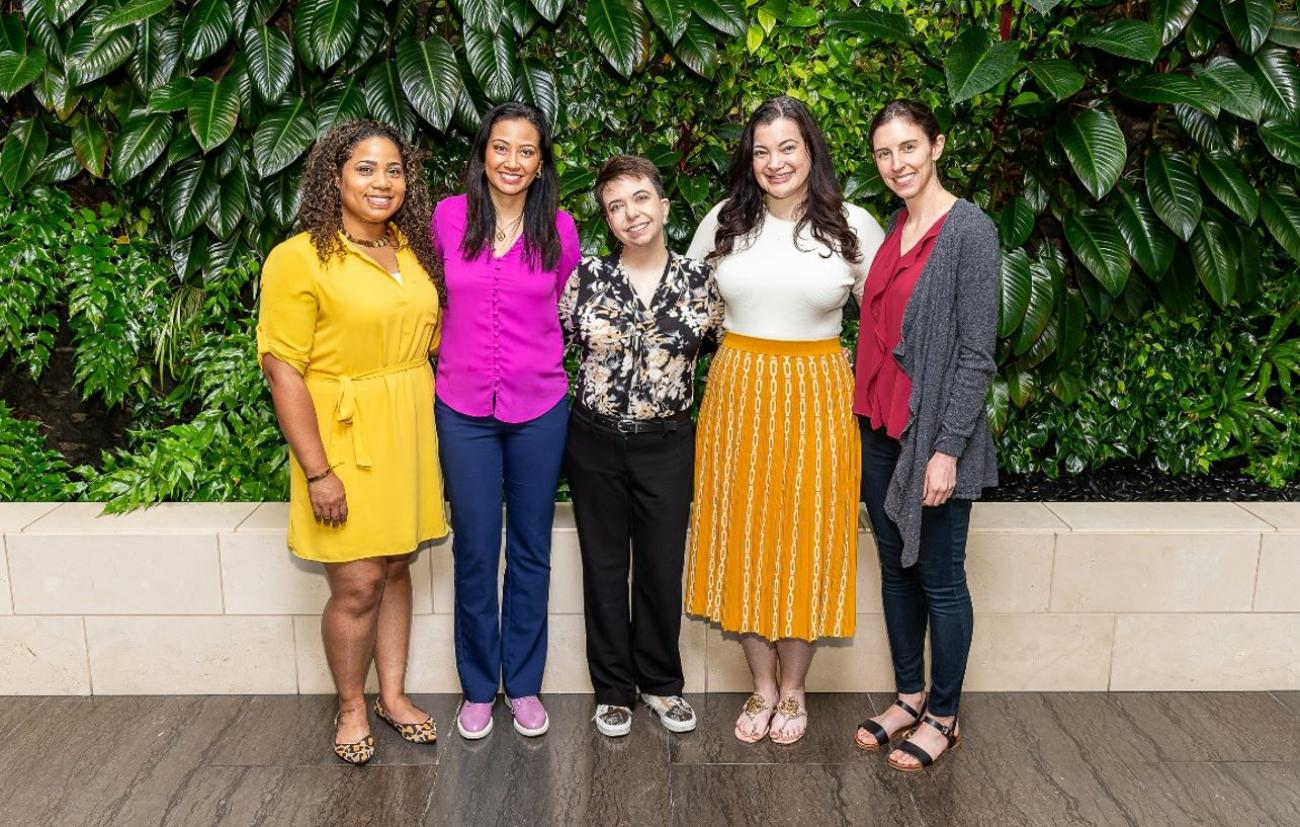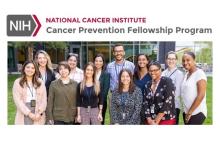
The NCI Cancer Prevention Fellowship Program – Developing Multidisciplinary Scientists and Expanding the Cancer Prevention Workforce
December 11, 2024
The Cancer Prevention Fellowship Program (CPFP), NCI’s distinctive postdoctoral fellowship program that combines independent, mentored research with training in translational cancer prevention…
The Cancer Prevention Fellowship Program (CPFP), NCI’s distinctive postdoctoral fellowship program that combines independent, mentored research with training in translational cancer prevention science, population health, leadership, and communication, is nearing its 40th anniversary. In light of this milestone, the CPFP, led by Acting Director, Jessica Faupel-Badger, Ph.D., M.P.H., took the opportunity to re-connect with program alumni across the globe and evaluate long-term outcomes of the program.
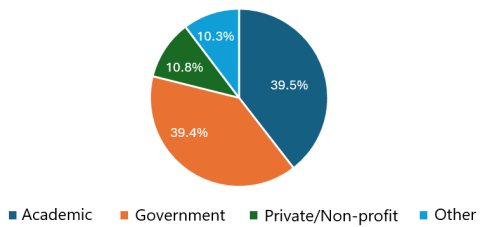
A Program Ahead of Its Time
Since its inception in 1987, the CPFP has been at the forefront of postdoctoral and cancer prevention research training by deliberately seeking to recruit candidates across disciplines – from the laboratory, clinical, population, and social and behavioral sciences – to apply their talents to cancer prevention research. In this way, the program has expanded the cancer prevention research workforce by recruiting post-doctoral researchers who may not have previously worked in this area and providing them with the foundation to be successful in transitioning to the field.
“The Cancer Prevention Fellowship Program has been a pioneering program since it began nearly 40 years ago, said Philip Castle, Ph.D., M.P.H., director of DCP and CPFP alumnus. “Within a few short years of NCI establishing a Division of Cancer Prevention and Control in 1983, its leaders recognized the importance of building a cross-trained multidisciplinary workforce to bring the possibility of cancer prevention to communities across the United States and the world.”
Read the full NCI Division of Cancer Prevention Science blog.
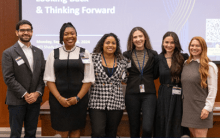
The CPFP Convenes for a Fall Symposium
November 27, 2024
The National Cancer Institute (NCI) Division of Cancer Prevention (DCP) Cancer Prevention Fellowship Program (CPFP) recently convened Cancer Prevention Fellows (CPFs) to discuss the evolving nature…

The National Cancer Institute (NCI) Division of Cancer Prevention (DCP) Cancer Prevention Fellowship Program (CPFP) recently convened Cancer Prevention Fellows (CPFs) to discuss the evolving nature of cancer prevention and related scientific careers. Organized and led by current CPFs, the symposium featured presentations from former fellows, panel discussions, and networking opportunities to drive discourse around these subjects and the broader research and career interests of CPFs.
The Planning Committee dedicated this year’s Fall Symposium to the memory of CPFP alumnus David C. Wheeler, Ph.D., M.S., M.P.H.—a great scientist, mentor, and cherished friend who passed away earlier this year.
Keynote Presentation
Sheri Schully, Ph.D.
Deputy Chief Medical and Scientific Officer, All of Us Research Program, National Institutes of Health (NIH)
Dr. Schully provided an overview and discussed the importance of the All of Us Research Program. Established in 2015, the program aims to accelerate health research and medical breakthroughs by enabling individualized prevention treatment and care. To meet this goal, the program compiles one of the largest, richest biomedical datasets, which is broadly available and secure.
The database prioritizes racial, ethnic, and socioeconomic diversity to better represent groups that biomedical research has historically neglected. This data can help inform thousands of studies and enable more equitable approaches to health care. So far, the program has enrolled more than 834,000 participants.
The program also offers comprehensive research tools and resources to support numerous types of data analysis, including genomic data analysis. In fact, the All of Us Researcher Workbench has one of the largest sets of whole-genome sequences widely available for research.
All of Us is already making a significant impact on biomedical research. In 2023, University of Maryland undergraduate Anav Babbar identified more than 10 unique genes associated with hypothyroidism, thanks to access to diverse population data. Remarkably, this analysis took just 6 weeks to complete compared to a similar study in 2011 that took 2.5 years and the efforts of 40 researchers. This breakthrough underscores how advancements in data accessibility and technology are revolutionizing the pace of discovery in science. To learn more and browse the data, visit https://allofus.nih.gov.
Presentations with Q&A
Gretchen Gierach, Ph.D., M.P.H.
Director/Senior Investigator, Integrative Tumor Epidemiology Branch, Division of Cancer Epidemiology and Genetics, NCI, 2006 Cohort
Michelle Doose, Ph.D., M.P.H.
Program Director, Office of Cancer Survivorship, Division of Cancer Control and Population Sciences, NCI, 2019 Cohort
Dr. Gierach presented her research on the link between breast density and breast cancer risk. She noted that breast density can help identify the molecular causes and patterns of breast cancer. Her interest in the epidemiology of breast cancer dates back to her women’s health research as an undergraduate student. In her talk, Dr. Gierach stressed the importance of pursuing research topics you feel passionate about. Building collaborations, promoting diversity in our work and teams, and being kind to ourselves and others were key takeaways. She also spoke about her meaningful experiences mentoring junior researchers.
Dr. Doose highlighted the need for health equity in cancer survivorship research, particularly in addressing disparities in long-term outcomes and care transitions. Adults who underwent cancer treatment in childhood often experience an increased risk for adverse, long-term health issues. For example:
- More than 60% of childhood cancer survivors will develop one or more chronic health conditions.
- More than 20% of these survivors will experience severe or life-threatening complications in adulthood.
- Minoritized survivors of childhood cancers are more likely to experience disparities in health care.
At the NCI Office of Cancer Survivorship, Dr. Doose reviewed 724 NIH cancer survivorship grants from 2017 to 2022, finding that 20% focused on health disparities. She mapped each grant’s determinants of disparities and identified future research opportunities. She noted that heath equity should be incorporated into everything we do, whether it’s through storytelling to create connections, asking tough questions about the systems that drive disparities, or checking our own biases in research.
Dr. Doose also reinforced that collaboration across disciplines and institutions is essential for advancing cancer research and filling gaps in existing knowledge.
Dr. Doose also reinforced that collaboration across disciplines and institutions is essential for advancing cancer research and filling gaps in existing knowledge.
Exploring Your Career Options
Samantha Sutton, Ph.D.
Career Coach/Scientist/Engineer/Coach of Sallie Rosen Kaplan (SRK) Postdoctoral Fellowships for Women Scientists and the NCI Diversity Career Development Program (DCDP)
Dr. Sutton discussed the uncertainty postdocs commonly face when pursuing a career and presented a four-step model using engineering techniques as a way to help people find careers they love. The process includes gathering and evaluating possibilities, identifying challenges, and finding solutions. In particular, she emphasized the importance of:
- Informational interviews: A key tool for career exploration involving open-ended questions, leveraging one’s network, and staying in touch
- Iterative career development: Continually repeating the process of exploring, rating, and refining career options through research, networking, and action until you find a path that truly excites you
Career Panel Session
Toward the end of the day, five CPFP alumni took the stage to share their experiences in the program and their current work and research focus.
Ian Buller, Ph.D., M.A.
Epidemiologist, DLH Corporation, 2019 Cohort
Key takeaways
- Flexibility and autonomy in private industry allow scientists to support diverse clients and contribute to research as methodologists, akin to academia.
- Informational interviews and assessing one’s skillsets are essential for transitioning into administrative roles and finding the best fit in science-related industries.
- Career development in industry involves navigating contracts, building a portfolio, and managing client relationships for job security.
Jessica Faupel-Badger, Ph.D., M.P.H.
Acting Director, CPFP, DCP, NCI, 2004 Cohort
Key takeaways
- Working across scientific disciplines provides broad exposure, allowing you to stay conversant in many areas of research, which is necessary for translational science.
- Government careers can traverse a variety of roles and scientific interests, thus providing opportunities for creativity and exploration.
- Taking risks and positioning yourself for leadership roles through collaboration and mentorship are key to long-term success.
Gretchen Gierach, Ph.D., M.P.H.
Director/Senior Investigator, Integrative Tumor Epidemiology Branch, Division of Cancer Epidemiology and Genetics, NCI, 2006 Cohort
Key takeaways
- Staying involved with studies you helped launch and building strong collaborative relationships can significantly impact your research trajectory.
- Mentorship and shadowing others play vital roles in preparing for leadership, especially when balancing career and personal life.
- Leadership involves moving from individual research to managing and mentoring others, requiring a shift in focus from personal achievements to team development.
Elmer Huerta, M.D.
Clinical Professor of Medicine, School of Medicine and Health Sciences, George Washington University, 1991 Cohort
Key takeaways
- Accessible and effective science communication is crucial for reaching broader audiences and educating the public about cancer prevention.
- Patients and real-world outcomes serve as a major inspiration for continued work in cancer prevention and public health education.
- Persistence in pushing for cancer prevention and creating collaborative opportunities are key to making a lasting impact on public health.
Brittany Jenkins-Lord, Ph.D., M.P.H., M.S.
Assistant Professor, Bloomberg School of Public Health, School of Medicine, Johns Hopkins University, 2019 Cohort
Key takeaways
- Launching your lab requires mastering budgeting, grant writing, and long-term planning—skills often not covered during government or academic training.
- Informational interviews are invaluable for learning about challenges like managing grants and budgets and helping you prepare for leadership roles.
- Promoting yourself, documenting accomplishments, and continually applying for opportunities are critical for advancing in academia and beyond.
Conclusion
The symposium offered a rich blend of scientific insights, career development guidance, and networking opportunities for fellows and alumni alike. From discussions on innovative research in cancer prevention to reflections on diverse career paths, attendees gained valuable perspectives on shaping the future of the field. The event also underscored the lasting impact of the CPFP community, fostering meaningful connections between past and present fellows that will continue to influence their research and professional journeys. This year’s Planning Committee was composed of Alexandra Harris, Ph.D., M.P.H., M.S.; Audrey Goldbaum, Ph.D., M.P.H. (co-chair); Courtney Dill, Ph.D., M.S.C.R, M.S.; Jennifer McGee-Avila, Ph.D., M.P.H.; Lindsey Page, Ph.D., M.P.H.; and Shahriar Zamani, Ph.D. (co-chair), with special gratitude for the support from CPFP and DCP in making this event a success.
Image Gallery
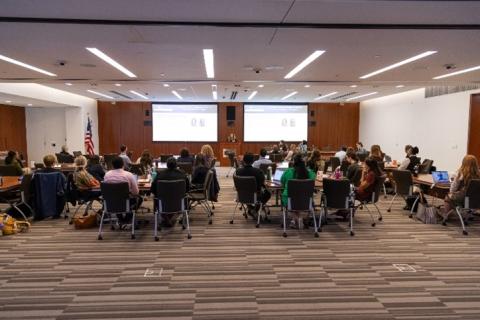
|
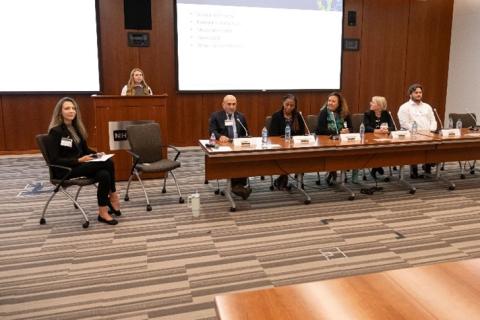
|
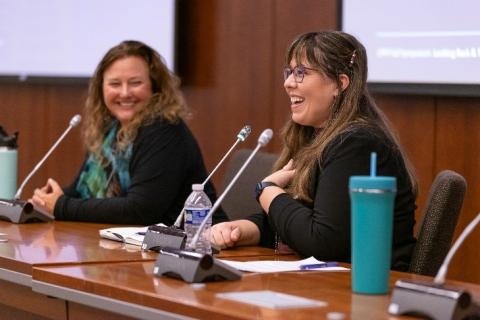
|
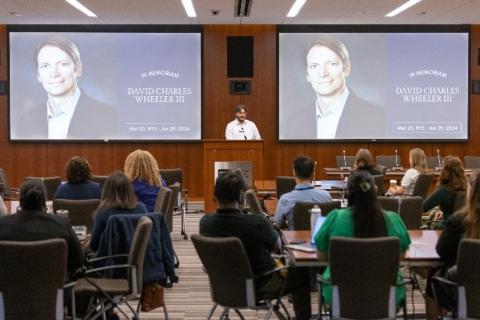
|
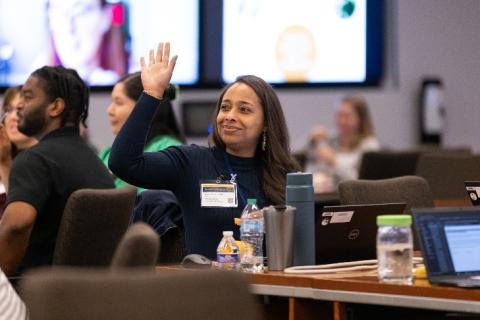
|
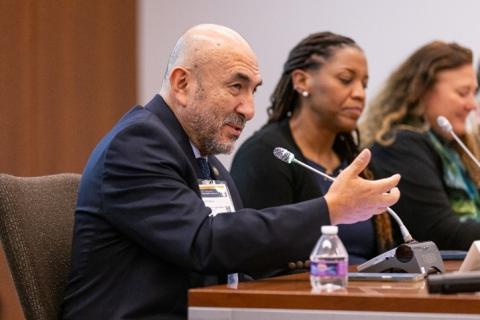
|
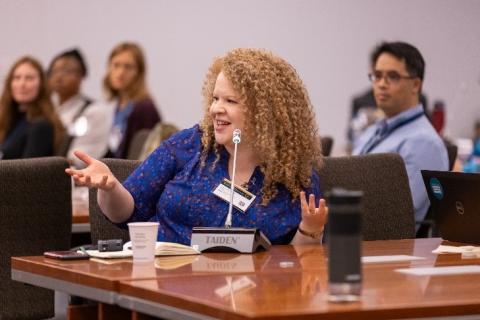
|
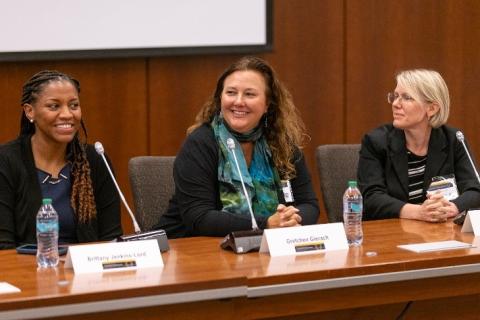
|
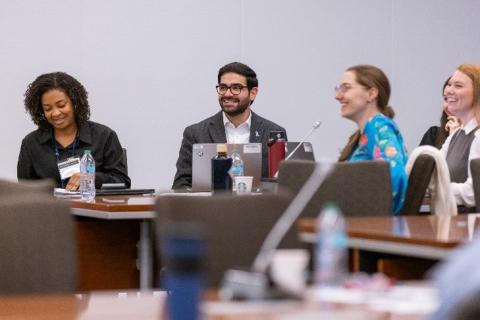
|

2025 NIH Felcom Fellows Award for Research Excellence (FARE)
July 11, 2024
The Cancer Prevention Fellowship Program congratulates Drs. Alexandra Harris, Rebecca Kelly, Kyra Mendez, and Shahriar…
The Cancer Prevention Fellowship Program congratulates Drs. Alexandra Harris, Rebecca Kelly, Kyra Mendez, and Shahriar Zamani. Their contributions to cancer prevention research have earned them a 2025 NIH Felcom Fellows Award for Research Excellence (FARE)! Each of their abstracts were deemed outstanding based on scientific merit, originality, experimental design and overall quality and presentation.
2025 CPFP FARE Awardees

Association of early menarche with breast tumor molecular features and recurrence |

Mosaic loss of the Y chromosome in leukocytes is associated with prostate cancer risk |
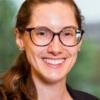
The relationship between COVID severity and telomeres in the context of hematopoietic cell transplantation |

Germline variants in cancer susceptibility genes and subsequent neoplasm risks after childhood cancer: A pooled analysis of two large-scale cohorts |
The NIH Felcom FARE award is a distinguished recognition program that celebrates exceptional research achievements among NIH fellows. FARE acknowledges and honors fellows who have showcased outstanding innovation and scientific contributions through their projects. By highlighting their impactful work, FARE promotes collaboration and knowledge exchange within the NIH community, fostering an environment of research excellence and advancement.
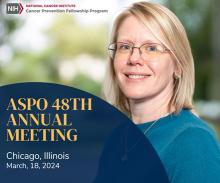
Jessica Faupel-Badger, Ph.D., M.P.H., CPFP Acting Branch Director, presents at the 48th American Society of Preventive Oncology (ASPO) Annual Meeting
April 5, 2024
Dr. Jessica Faupel-Badger, the NCI’s Cancer Prevention Fellowship Program (CPFP) Acting Branch Director presented, “Chemoprevention: An Evolving Definition,” at the ASPO 48th Annual…
Date: Monday, March 18, 2024
Session: Symposium 2: Innovation in Chemoprevention
Session Time: 11:30 AM – 12:15 PM (ET)

2023 Merit Award Winners
August 31, 2023
The Cancer Prevention Fellowship Program recently announced its 2023 Merit Award Winners, recognizing the exceptional contributions of Drs. Kate Elfer, Alexandra Harris, Jennifer McGee-Avila, and…
The Cancer Prevention Fellowship Program recently announced its 2023 Merit Award Winners, recognizing the exceptional contributions of Drs. Kate Elfer, Alexandra Harris, Jennifer McGee-Avila, and Esmeralda Ramirez-Peña. The winners were honored at the Annual Potluck, a celebration marking the culmination of a year and the welcoming of a new cohort of fellows.

Dr. Kate Elfer, a recipient of the program's Merit Award, has made significant strides in various areas of cancer research. Their expertise spans digital pathology, medical devices, regulatory aspects of diagnostic devices, artificial intelligence/machine learning, image perception, and the integration of sex and gender in research. Dr. Elfer's contributions have been supported by research funds from prestigious organizations such as the NCI-FDA Interagency Oncology Task Force and the Food and Drug Administration, Center for Devices and Radiological Health, FDA/CDRH Office of Science and Engineering Laboratories. They have developed continuing medical education courses and been recognized for their involvement in esteemed events, including the STEM Representation Matters Series at Brown University and the Biomedical Engineering Departmental Seminars at UMass Lowell. Dr. Elfer's commitment extends to serving as a co-chair in working groups such as the FDA DigiPath and AI/Machine Learning Working Groups. Additionally, they actively mentors aspiring researchers through programs like the CPFP Peer Mentoring Program and FDA PRIDE Mentoring Committee. Their exceptional contributions to the Peer Mentoring Program have earned her the prestigious NCI Director's Champion Award in 2023. Dr. Elfer also takes an active role in service within the CPFP, they served as former co -chair of the Fellows Advisory Board CDSS committee, and organizes the CPFP Book Club.

Dr. Alexandra Harris, another recipient of the 2023 Merit Award, has made remarkable strides in cancer research. Her dedication to bringing the worlds of laboratory science and molecular epidemiology to study the breast tumor microenvironment, molecular underpinnings of epidemiologic risk factors, and breast cancer disparities in women of African descent has garnered widespread recognition and support. Dr. Harris has been honored with prestigious accolades such as the CPFP Transdisciplinary Fellowship Research Award, Division of Cancer Epidemiology and Genetics (DCEG )Intramural Research Award, and, together with her mentors, the Center for Cancer Research (CCR) Health Disparities Flex Award. Her commitment to science communication, Diversity, Equity, and Inclusion (DEI) , and outreach is evident through her leadership roles in significant initiatives like the CPFP Grants and Scientific Writing Committee and active participation in the DCEG Cancer Health Disparities Fellows Interest Group, DCEG Inclusivity Minute Project, and NCI Cancer Community Partnership. Dr. Harris's passion for mentorship is exemplified through her involvement in programs like the CPFP Peer Mentoring Program for which she earned an NCI Director's Champion Award, and STEM for Her, where she empowers aspiring researchers and promotes diversity in STEM.

Dr. Jennifer McGee-Avila has also been honored with a merit award for her notable contributions to cancer prevention research. Her achievements span a wide range of areas, including cancer prevention in people with HIV, cervical cancer, HPV-associated cancers, cancer inequities, and public health policy. Dr. McGee-Avila's active participation in influential initiatives such as the NIH Federal Cervical Cancer Collaborative, focusing on cervical cancer elimination, and the Division of Cancer Control and Population Sciences (DCCPS) Evidence-Based Cancer Control Policy Research Working Group, and the DCEG Cancer Health Disparities Fellows Interest Group, showcases her dedication to the field. She has been recognized with prestigious awards, including the NCI Director's Champion Award and the Sallie Rosen Kaplan Fellowship. Dr. McGee-Avila's involvement in various working groups, councils, and committees highlights her commitment to addressing cancer health disparities. As a mentor, she actively contributes to programs like the CPFP Peer Mentoring Program and the Robert Wood Johnson Foundation's Health Policy Research Scholars Program.

Dr. Esmeralda Ramirez-Peña, a distinguished recipient of this Cancer Prevention Fellowship Program's prestigious award, has made exceptional contributions to cancer prevention research. Her expertise in real-world and clinical trial data analysis, chemoprevention, and cancer recurrence measurements has led to her work being presented at renowned events. Esteemed institutions have recognized Dr. Esmeralda Ramirez-Peña's work, reflecting the quality and impact of her research. With a commitment to collaboration, she actively engages with national and international partners, participating in working groups focused on addressing cancer recurrence and systemic racism. Dr. Ramirez-Peña's notable accolades include the NCI Director's Emerging Leaders Award and the NCI Director's Champion Award, further underscoring her contributions to the field. As a mentor in the CPFP Peer Mentoring Program, she plays a pivotal role in empowering aspiring researchers and cultivating a diverse and inclusive environment in STEM. Her dedication to fostering equity and promoting underrepresented groups' involvement in research is evident.
The Cancer Prevention Fellowship Program's 2023 Merit Award winners, Drs. Kate Elfer, Alexandra Harris, Jennifer McGee-Avila, and Esmeralda Ramirez-Peña, represent the program's commitment to recognizing excellence in cancer prevention research. Their diverse expertise, significant contributions, and dedication to mentorship underscore the program's mission of advancing the field and reducing the burden of cancer. These accomplished researchers serve as inspirations for the future generation of cancer prevention scientists.
